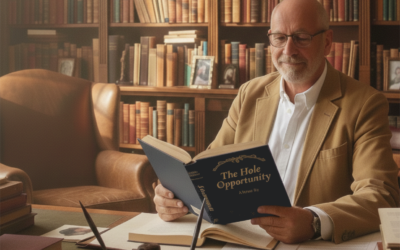R.w. Meek Shares Insight on The Dream Collector

PHOTO: R.w. Meek, award-winning novelist and art historian, celebrated for creating stories that blend historical authenticity with emotional resonance.
Exploring Art, History, Psychology, And The Human Spirit
Award-winning author R.w. Meek reflects on The Dream Collector, a novel that brilliantly intertwines historical truth, art, and the emotional depths of love, suffering, genius, and the essence of innocence.
R.w. Meek, an award-winning novelist and art historian, masterfully bridges history, psychology, and the arts in his ambitious two-part novel The Dream Collector. By intertwining the lives of legendary figures Sigmund Freud and Vincent van Gogh with the luminous, fictional Sabrine, Meek crafts a profound exploration of creativity, suffering, and the elusive nature of human innocence.
With a deep background in Art History, particularly in Impressionism and Post-Impressionism, Meek blends historical accuracy with imaginative storytelling, creating narratives that feel both scholarly and emotionally resonant. At the heart of The Dream Collector is Meek’s exploration of how art, love, and human vulnerability intersect in powerful and often painful ways, questioning how resilience arises from betrayal, abandonment, and the search for identity and belonging.
R.w. Meek combines exceptional storytelling with historical research to create immersive narratives that leave readers both inspired and reflective.
The novel is comprised of two standalone books, “Sabrine & Sigmund Freud” and “Sabrine & Vincent van Gogh,” but was conceived as a unified work rather than a series. Book I delves into Freud’s early career in Paris in 1886, a pivotal year that shaped his future discoveries, while Book II follows Sabrine and van Gogh’s increasingly self-destructive relationship.
For Meek, historical fidelity is crucial, with key scenes relying on archival sources and personal correspondence for authenticity. For instance, Freud’s controversial and often-overlooked experimentation with cocaine is explored in the context of his time studying under the neurologist Jean-Martin Charcot. Similarly, Vincent van Gogh’s personal letters to his brother Theo form the backbone of his portrayal, including the exact details surrounding the tragic final days of van Gogh’s life.
Central to the story is Sabrine, a character inspired by Meek’s desire to create a true embodiment of innocence. Described as a spark to those around her—including Freud, her therapist, and van Gogh, her lover—Sabrine serves as a mirror reflecting themes of betrayal, abandonment, and human frailty. One reader even likened her to the character Alyosha from Fyodor Dostoevsky’s The Brothers Karamazov, which Meek cites as one of his greatest influences alongside the works of Antoine de Saint-Exupéry and John Fowles.
Meek draws upon a variety of historical sources to enrich the emotional and narrative depth of the novel. Details such as Monet’s episode of hysterical blindness following personal loss are reimagined with creative license. The result is a beautifully layered exploration of how personal trauma and societal exile impacted both Freud and van Gogh, two towering figures of the late 19th century.
Not only does The Dream Collector grapple with their genius and struggles, but it also asks important questions about the transformation and redemption offered through art. Meek notes his desire to examine, through the fictional and historical characters alike, whether one can truly recover after betrayal and abandonment. Much of his narrative inspiration stems from Vincent van Gogh’s self-perception as a “stranger on this earth” and the trauma rooted in their respective lives.
Currently, R.w. Meek is adapting The Dream Collector into a screenplay, fueled by his proximity to Hollywood and a list of actors he envisions in key roles. For the novel’s pivotal female leads, he names stars such as Saoirse Ronan, Monica Barbaro, Suzanna Son, and acclaimed Los Angeles theater actress Ann Noble as top choices.
The Dream Collector continues to captivate readers with its rare combination of historical authenticity, psychological depth, and an unflinching exploration of the human spirit. Through his compelling narrative, R.w. Meek reminds us that even the most brilliant and broken souls are bound by universal struggles of love, identity, and the search for purpose.
Source: Reader’s House Magazine













